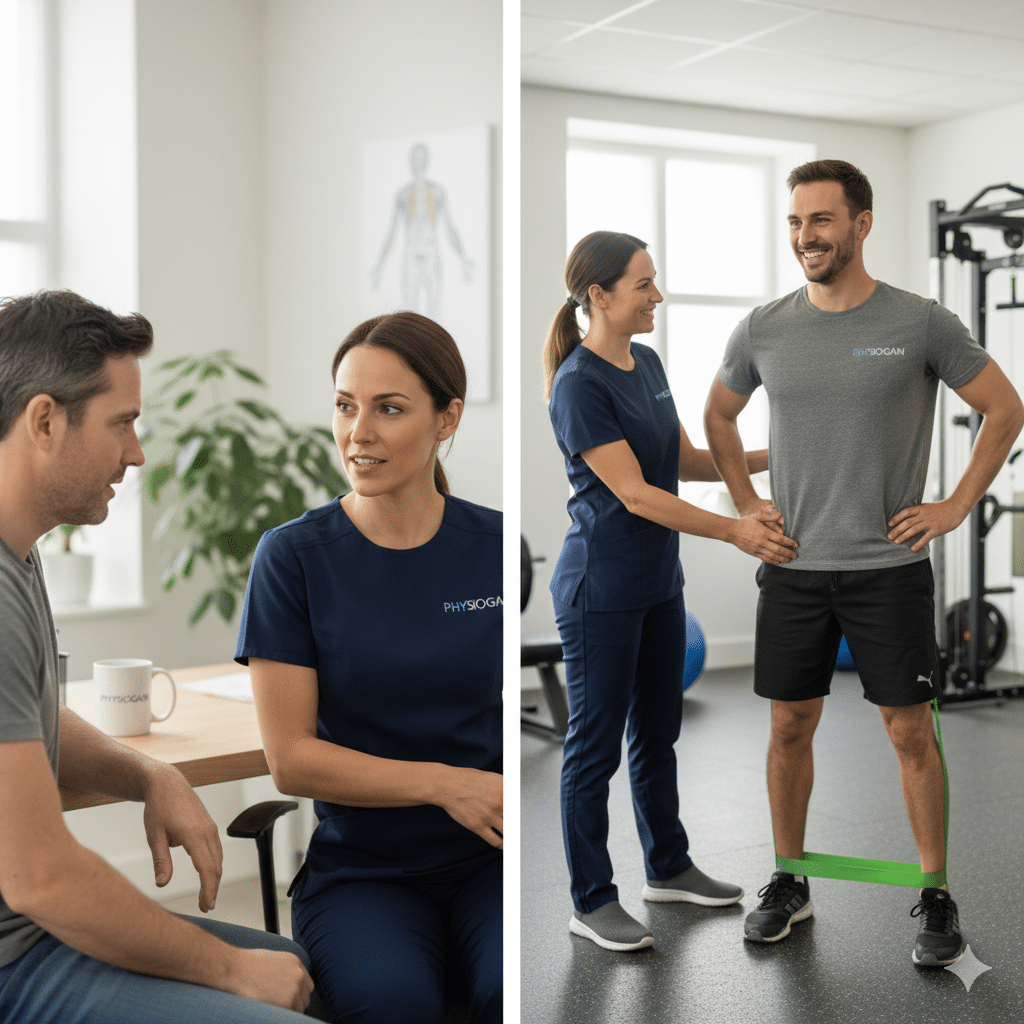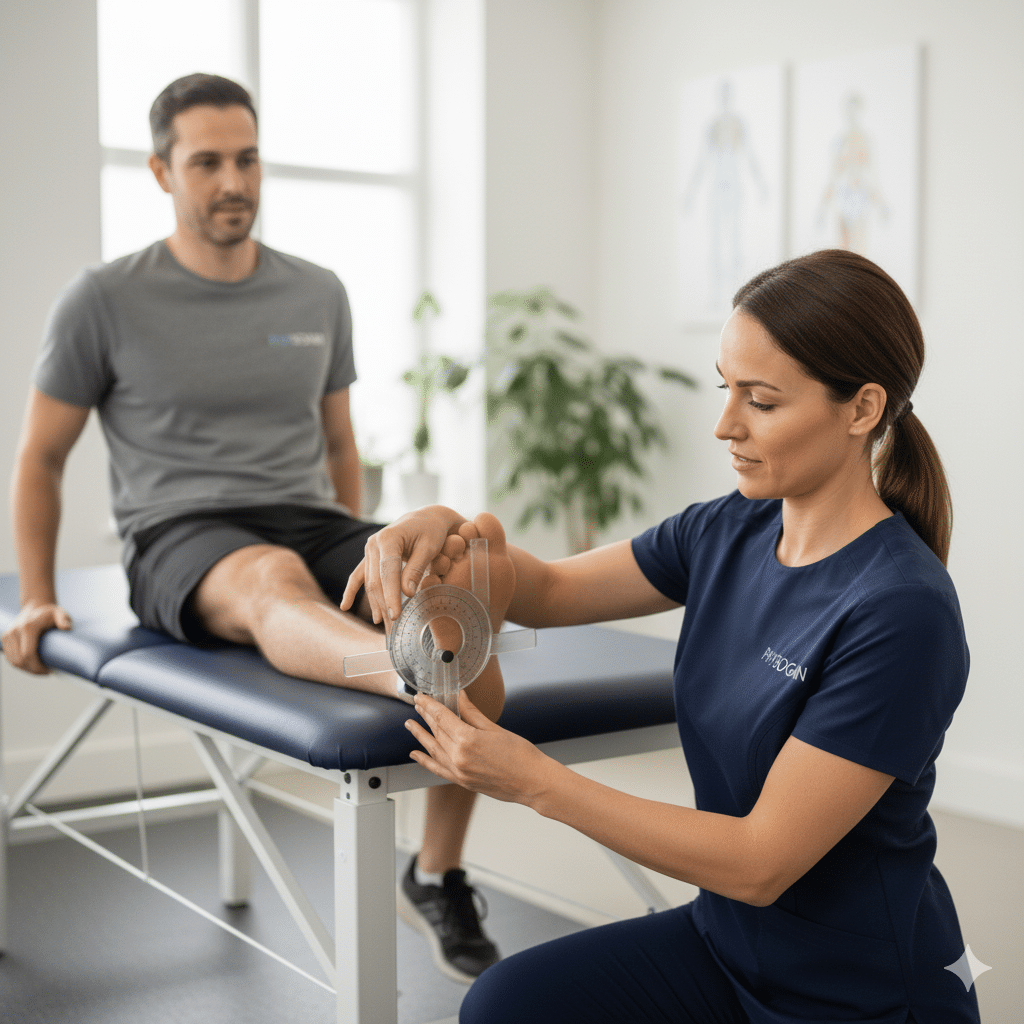You’ve decided to seek help for that nagging back pain, the stiff shoulder, or the sports injury that just won’t heal.
That’s a fantastic first step.
But a quick search for “physiotherapist near me” can leave you with a dizzying number of options. How do you know who to trust with your health, your time, and your money?
Here’s the truth: Not all physiotherapy is created equal.
The difference between a fast, lasting recovery and months of frustrating, ineffective treatment often comes down to the quality of care and the philosophy of the clinic you choose. Finding the right fit is about more than just proximity or a flashy website; it’s about finding a healthcare partner who is invested in your personal recovery journey.
To make an informed decision and ensure you get the best possible care, you need to become an empowered patient. And that starts with asking the right questions. We’ve compiled the five most critical questions you should ask any physiotherapist before you commit to your first session.

Question 1: “Will I see the same physiotherapist every time?”
Why This Question Matters
Imagine telling your entire life story to someone, only to have to repeat it to a different person the following week, and another the week after. That’s what can happen at some high-volume clinics. Continuity of care is arguably one of the most important factors in successful physiotherapy.
When you work with a single, dedicated therapist, they develop an in-depth understanding of your condition. They learn the nuances of your movement, remember your specific goals, and can accurately track your progress from one session to the next. This builds a strong therapeutic alliance based on trust and familiarity, which is proven to improve outcomes. You’re not just a “sore back” on the schedule; you are a person with a unique history and a story they know well.
What a Great Answer Looks Like
“Yes, absolutely. We strongly believe that a consistent patient-therapist relationship is key to a successful recovery. You will be paired with a dedicated physiotherapist who will manage your entire care plan, from the initial assessment all the way to discharge. This ensures your progress is closely monitored and your treatment can be adjusted precisely when needed.”
Red Flags to Watch For
Vague answers like, “You’ll see whichever therapist is available that day,” or “We encourage our patients to work with everyone on our team.” While a collaborative team is good, a lack of a primary therapist can lead to disjointed care, repetitive questioning, and a plan that lacks a clear, consistent direction.

Question 2: “What does a typical treatment session involve?”
Why This Question Matters
This question peels back the curtain on the clinic’s entire treatment philosophy. The answer tells you whether their approach is active or passive, personalized or generic. Are you going to be an active participant in your recovery, or will you be passively hooked up to a machine for 30 minutes?
Modern, evidence-based physiotherapy is a hands-on, active process. While passive modalities like heat packs or ultrasound can have a place, they should be a small part of a much broader, more engaged strategy.
What a Great Answer Looks Like
“A typical one-on-one session is very active and focused entirely on you. It begins with a brief check-in to discuss your progress and any challenges since your last visit. This is followed by a combination of manual therapy, where I’ll use hands-on techniques to improve joint mobility and release soft tissue restrictions. Then, we’ll move into therapeutic exercise, where I’ll guide you through specific movements designed to correct imbalances and build strength. The final part is always patient education, ensuring you understand what’s causing your issue and how the home program will help.”
Red Flags to Watch For
An overemphasis on passive treatments. If the answer is, “We’ll get you started on a heat pack, then some TENS, and then you’ll do some exercises on your own in the corner,” be cautious. This “assembly line” approach lacks the personalized attention needed for complex issues and often fails to address the root cause of the problem.
Question 3: “Do you create personalized home exercise programs?”
Why This Question Matters
Your physiotherapy session might only be 45-60 minutes, once or twice a week. The real magic happens in the hours and days between appointments. A home exercise program (HEP) is your roadmap to recovery. It’s how you reinforce the gains made during your session, build new motor patterns, and progressively strengthen your body.
A clinic that prioritizes a detailed, personalized, and evolving HEP is a clinic that is invested in your long-term success. They are empowering you to become the hero of your own recovery story, not just a passive recipient of treatment.
What a Great Answer Looks Like
“Without a doubt. Your home program is one of a kind—designed just for you. After every session, we will review and progress your exercises based on how you’re doing. We provide clear instructions, often with access to online videos, so you know exactly what to do and how to do it correctly. We see your recovery as a partnership, and your HEP is the most critical part of your contribution.”
Red Flags to Watch For
“Here’s a generic, photocopied sheet of exercises for ‘back pain’.” A one-size-fits-all approach to exercise is rarely effective and can sometimes even be detrimental. If there’s no plan to regularly update and tailor the program to your specific progress, the clinic may not be focused on your long-term functional improvement.

Question 4: “What is your experience with my specific condition?”
Why This Question Matters
All licensed physiotherapists have a broad knowledge base, but many develop special interests or pursue advanced certifications in specific areas like sports medicine, pelvic health, vestibular (dizziness) disorders, or neurological conditions.
Asking about their experience with your specific issue isn’t about challenging their credentials; it’s about finding the best possible match for your needs. A confident and detailed answer will give you peace of mind that you’re in expert hands.
What a Great Answer Looks Like
“That’s an excellent question. I have a great deal of experience working with patients who have [your specific condition]. In fact, it’s an area I’m particularly passionate about. Our approach is to first identify the root cause, which for [your condition] is often related to [e.g., nerve compression, muscle imbalance, poor biomechanics]. We then use a combination of [e.g., manual therapy to decompress the area and targeted exercises to stabilize the joint] to not only relieve your symptoms but prevent recurrence.”
Red Flags to Watch For
A vague or overly generalized answer like, “Oh, we treat everything.” While likely true, it lacks the confidence and specificity that should make you feel comfortable. If they can’t speak clearly about a common approach or the underlying factors of your condition, they may not have the depth of experience you need.
Question 5: “How will we measure progress?”
Why This Question Matters
Effective treatment is not guesswork. While “feeling better” is the ultimate goal, a professional, evidence-based approach relies on objective data to track progress. This ensures your treatment plan is working and allows the therapist to make informed decisions about when to advance your program.
This question reveals if the clinic has a structured, goal-oriented system in place. It shows they are accountable for the results they promise.
What a Great Answer Looks Like
“We are very goal-oriented. During your first session, we’ll establish a baseline by measuring key metrics. This includes things like your range of motion using a goniometer, your strength using functional tests, and your pain and function levels using validated questionnaires. We will re-measure these markers at regular intervals to objectively track your improvement and celebrate the milestones you hit on your way to achieving your main goal, whether that’s running a 5k or just being able to lift your grandchild without pain.”
Red Flags to Watch For
“You’ll know you’re better when it stops hurting.” This subjective-only approach lacks professional rigour. Without objective measures, it’s difficult to know if the underlying cause of the pain is truly being resolved or if you’re just having a few good days.

Your Health is Your Greatest Investment
Choosing a physiotherapist is a significant decision in your healthcare journey. By asking these five questions, you transform from a passive patient into an active, informed consumer. You equip yourself to find a provider who is not just qualified, but who is the right partner for you.
You deserve a physiotherapist who offers consistent care, uses a personalized and active approach, empowers you with the tools for long-term success, has deep expertise in your condition, and is committed to measuring what matters.
Ready to Experience the Difference?
At Physiogain, we’re proud to answer these questions with a confident “yes.” We believe in personalized, consistent, and goal-driven care that puts you at the center of your recovery.
Ready to experience the difference for yourself? Book your first session with our expert team today.